
Theatre games for Theatre Educators
- Subject:
- Arts and Humanities
- Literature
- Theater
- Material Type:
- Teaching/Learning Strategy
- Provider:
- Reimagine Teaching
- Provider Set:
- Utah Shakespeare Festival
- Date Added:
- 12/08/2020

Theatre games for Theatre Educators

Theatre games for Theatre Educators

Theatre games for Theatre Educators

Theatre games for Theatre Educators
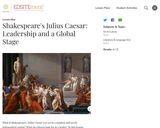
What if Shakespeare's Julius Caesar was set in a modern and newly independent nation? What do citizens look for in a leader? In this lesson, students not only consider the significance of this updated staging and political quandary, but will address important questions about how and why Shakespeare is adopted, adapted, and appropriated by people around the world in order for them to express their own political and social concerns through the universal language of Shakespeare.
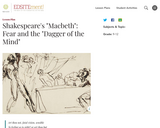
Shakespeare's preeminence as a dramatist rests in part on his capacity to create vivid metaphors and images that embody simple and powerful human emotions. This lesson is designed to help students understand how Shakespeare's language dramatizes one such emotion: fear.
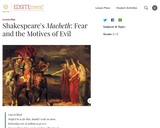
Students search an online version of Shakespeare's Macbeth for clues to the motives behind Macbeth's precipitous descent into evil.
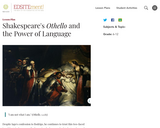
By means of group performances, writing exercises, and online search activities, students learn about the sometimes dangerous and destructive powers of language, particularly when wielded by such an eloquent and unscrupulous character as Shakespeare's Iago.
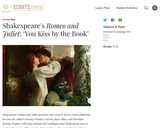
As one of literature's most iconic figures, both Shakespeare's plays and poetry provide an interesting glimpse into a variety of essential themes. In this lesson, students will examine how Shakespeare used the sonnet tradition to enhance his stagecraft by performing a scene from his play Romeo and Juliet.
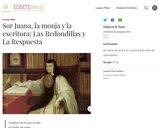
Sor Juana Inés de la Cruz, la primer gran poeta de América Latina, es considerada una de la figuras literarias más importantes del continente americano y una de las primeras feministas. En el siglo XVII, defendió su derecho a la educación, proponiendo la mayor participación de las mujeres en la cultura y la pedagogía en una sociedad dominada por los hombres.

This is a virtual lesson designed to give students an opportunity to listen to some classical pieces that were composed with a story in mind.
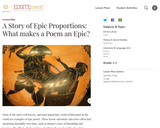
Some of the most the most essential works of literature in the world are examples of epic poetry, such as The Odyssey and Paradise Lost. This lesson introduces students to the epic poem form and to its roots in oral tradition.

This is a storytelling/writing lesson aimed for upper elementary students. They will create a digital story about a time in their life they got hurt. They will brainstorm, plan, and create their story. Then present the stories to the class. They will work collaboratively and on their own during the course of the lesson. This lesson is designed to take two one hour class sessions.Image credit: "Band Aid Flat Icon Vector.svg from Wikimedia Commons by Videoplasty.com, CC-BY-SA 4.0Standards: UT.ELA-Literacy.W.6.3 - Write narratives to develop real or imagined experiences or events using effective technique, relevant descriptive details, and well-structured event sequences. UT.ELA-Literacy.W.6.3d - Use precise words and phrases, relevant descriptive details, and sensory language to convey experiences and events.
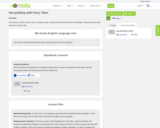
This resource will be used to write a narrative story. Students will demonstrate their knowledge of literary elements and elements of a fairy tale.

In this lesson students will make written and verbal connections between their thinking and text evidence. They will begin this understanding by observing different forms of media and identifying what within the media is influencing their thinking. Then using different samples of poetry, students will create annotations within a Pages template to delineate what within the text connects to their thinking. Students will create responses to questions about the poetry and explicitly support their thinking with text evidence. Photo Citation: Corbin, Courtney. Image created using Pages. 21 July, 2023. Author's personal collection.

This lesson can be broken up into smaller lessons to help young or special education learners begin to comprehend how stories work and what is being taught in them. Overall, the lesson should take about an hour.

What are we teaching and learning when we analyze films? Who's missing from the story? This resource is offered for teachers across the humanities who use film and incorporate opportunities for students to develop media analysis skills.
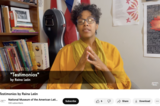
Afro Boricua poet, publisher and professor Raina León recites “Testimonios” in honor of the dearly departed poet Kamilah Aisha Moon. This video is one of the 2021 Dead Poets Open Mic Series created by the Smithsonian National Museum of the American Latino in collaboration with Mouthfeel Press.

This lesson is to help early readers and non readers understand and recall information from the story Caps for Sale, by Esphyr Slobodkina. This lesson is primarily for preschool children, but can be used with kindergarteners. Children will listen to the story of a peddler trying to sell his caps. The peddler takes a rest under a tree and when he awaks, the caps, which he keeps on his head, have vanished. He looks around and finally realizes that it's monkeys in a tree who have taken his caps. Once the story is read, children will choose a stick out a jar, containing a question or prompt about the book. This lesson is designed for a small group (3-5) of children. There are several extensions that can be done with this lesson including acting out the story and a small art project.

Technical Theatre video workshop for Theatre Educators